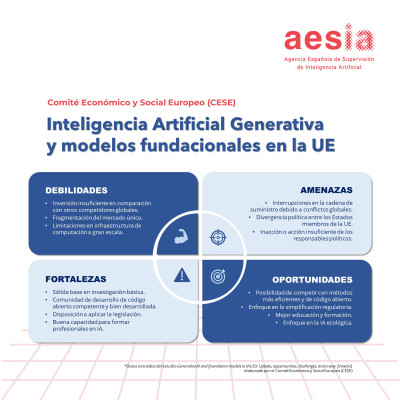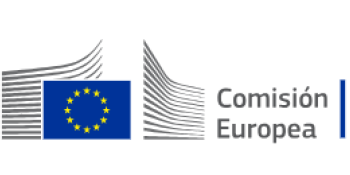
The European Economic and Social Committee (CESE), in collaboration with the Center for European Policy Studies (CEPS) has published a comprehensive report on the current landscape of Generative Artificial Intelligence (GenAI) and foundational models within the European Union analyzing its impact, technological developments and regulatory implications.
Some of the report's highlights include:
• Creating a unified AI terminology: The rapid evolution of generative AI and foundational models requires a unified terminology for effective communication. It is crucial to distinguish that GenAI creates content, while foundational models are broader and more adaptive. Achieving such clarity in definitions ensures that the technologies are developed, managed and deployed effectively across all sectors.
• Market dominance and dependence in the AI capabilities market: The Generative AI (GenAI) market is dominated by US companies, which account for more than 80% of global funding, while the EU faces challenges in investment and technological sovereignty, despite Chinese advances with lower cost models.
• The GenAI value chain in the EU: The GenAI value chain ranges from hardware manufacturers and data providers to model developers and end users; highlighting the vertical integration of technology giants such as Meta, Google and Microsoft with OpenAI, which generates efficiencies, but threatens competition and specialized EU startups. A balanced policy is required that supports both integrated solutions and innovations in key European sectors such as automotive, renewable energy and education.
• The way forward: the report, based on a SWOT analysis, suggests that, in order to strengthen the development of AI in the European Union, the EU must boost research, reduce regulatory barriers and foster talent and international collaboration, especially with the UK.
Finally, the study offers policy recommendations addressed to the European institutions, civil society organizations and the CESE itself, such as the identification of needs for more investment, skills development and regulatory clarity, and the need for greater collaboration with civil society organizations.
All this with the aim of fostering a competitive, ethical and inclusive European AI ecosystem.
The complete study is available at the following link: QE-01-25-014-EN-N_0.pdf

In our News section you will find information about the most relevant events, talks and conferences in the field of artificial intelligence.

Questions and answers about the AI ACT: Article 50

Guidelines on the scope of obligations of providers of general-purpose...
We use third-party cookies for analytical purposes, in summary we only use Google Analytics cookies to analyse our traffic.